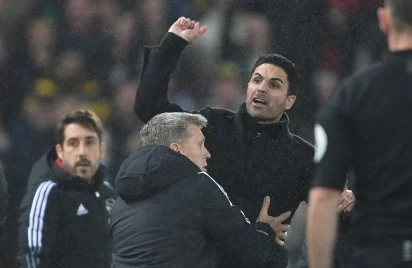
Can Arsenal Overcome Their Adversities and Rise Again?
Arsenal's exit from the Champions League at the hands of Paris Saint-Germain has raised pressing questions about the team's future and their ability to compete at the highest level. After a promising season, which saw them reach the semi-finals, the Gunners ended their campaign with yet another trophyless year. As the dust settles, the pressure mounts on manager Mikel Arteta to implement essential changes to steer Arsenal back to glory.
Despite a valiant performance in the semi-final, where they lost 3-1 on aggregate, Arsenal's inability to convert chances proved costly. After the second leg at the Parc des Princes, Arteta acknowledged that the team deserved more, stating they had "outplayed" PSG despite the result. Such sentiments echo a recurring theme throughout the season: a solid performance marred by missed opportunities.
Legendary football commentator Ally McCoist, who covered the match, expressed a bold prediction on TalkSport Bet, claiming, "Arsenal will win the Premier League next season" if they secure two pivotal signings, including a dedicated centre-forward. This assertion highlights the urgency for the club as speculation grows surrounding their summer transfer strategy. The Gunners’ current striking woes were particularly evident in their Champions League campaign, where the finishing touch faltered against an inspired Gianluigi Donnarumma.
Mikel Arteta's vision for Arsenal includes addressing these weaknesses head-on. In a recent interview with ESPN Brasil, he outlined a clear path forward: "We’re very clear about what we need to do to improve", indicating that the summer transfer window will be critical for their future success. With injuries and the departure of sporting director Edu last November impacting the team's stability, Arteta's focus will likely extend to both personnel and coaching staff enhancements.

However, there are doubts about Arsenal's capacity to adapt when faced with adversity. Analyst Stuart MacFarlane highlighted Arteta's rigid tactical approach, suggesting that the team struggles when matches deviate from their game plan. Critics argue that Arteta’s meticulous style, while effective under controlled circumstances, fails to prepare the team for the chaotic unpredictability of football.
This commentary draws attention to a critical challenge: as football continuously evolves, so too must Arsenal's approach. The need for adaptability and resilience in high-stakes situations cannot be understated. Arteta's recent comments have questioned whether such lessons are being absorbed by the team or if they remain mired in the specifics of statistical performance without a tangible adaptation to in-game adversity.
As the club looks towards the future, the upcoming transfer market will serve as a litmus test for Arteta's ambitions and the club’s commitment to return to the upper echelons of English football. Will Arsenal manage to bolster their lineup effectively in time for the upcoming season and regain their competitive edge? Only time will tell.
In conclusion, while there are glimmers of hope for Arsenal's resurgence, it ultimately hinges on their ability to learn from recent shortcomings. Fans are encouraged to share their thoughts: What changes would you like to see this summer to ensure Arsenal's success next season?